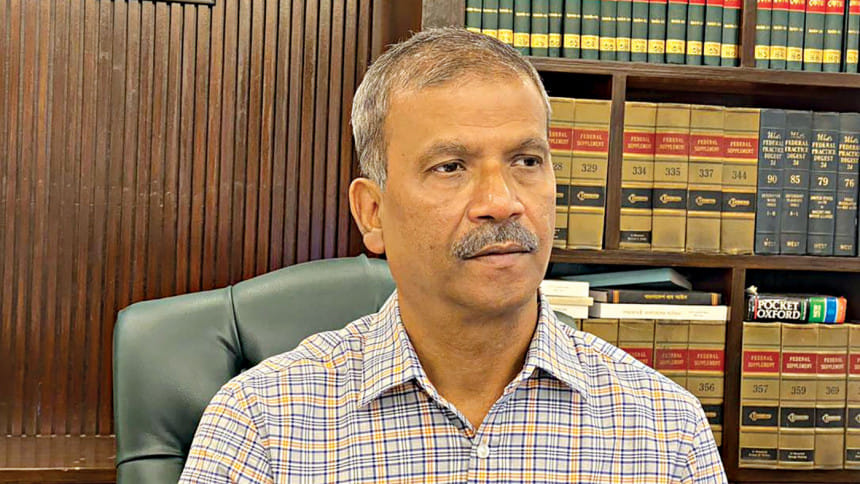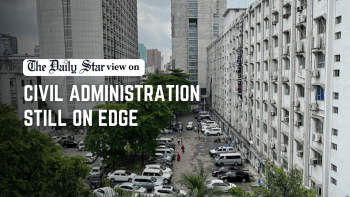Star interview: Reshuffle of officials for ensuring reforms

The interim government aims to reform the administration in order to make it people-oriented, inclusive, transparent, and accountable, says Law Adviser Asif Nazrul.
"Reforms involve more than just appointing qualified individuals. Competent people are being placed in positions to ensure that no one can obstruct the reform process. Reforms signify a shift towards a more people-oriented, inclusive, transparent, and accountable administration. We must make that happen," he said in an exclusive interview with The Daily Star.
Before the reforms, the administration, the judiciary and the police must get rid of those who helped an autocratic government sustain for over one and a half decades, he said, replying to a query on the massive reshuffle in different tiers of the administration and other bodies.
"Is it possible to bring reforms keeping in place the people committing extrajudicial killings? Is it possible to reform the police administration with Harun [Harunor Rashid, former chief of DMP's DB] still in the force? These people should be replaced by honest and competent ones," Asif said.
After bringing in these people, he said, reforms will be done in the institutions, laws and policies. Efforts were already made to withdraw false cases filed over the killings during the uprising in July and early August. "Now we will try to change the policy and laws so that this does not happen again in the future."
He said a lot of work had been done on reforms in Bangladesh in the past – the framework of the three alliances in 1991, constitutional reforms proposed by Serajul Alam Khan in the early 80s, and by many civil society organisations in different times.
"What was absent then was a lack of goodwill. Now, I believe we can deliver some good work because we have a leader [Prof Muhammad Yunus]," he added.
Speaking of reforms in the judiciary, the law adviser said a popular opinion about judicial reform is that the lower courts should be reformed first. However, to get an independent judiciary, the higher courts must be reformed first, according to him.
"Ensuring an independent lower court is to ensure the higher court's full authority on it. The higher court will govern and control the lower court, and the government will not intervene here. What's the point of giving [the control of] lower courts to the higher court if the higher court functions as a subordinate to the government?"
"So, we have to reform the higher court," he said.
Asif said the interim government has been working to this end as there was "anarchy" in the appointment of higher court judges during both Awami League and BNP governments with "incompetent, corrupt and partisan" people.
Steps for higher court reform will include amending the recruitment act and policy, rationalising the chief justice's sole authority over the entire judiciary, reforming the general administration committee of the Supreme Court's Appellate Division and the High Court Division, establishing an independent and dedicated secretariat for the higher court, and putting an end to recruiting retired judges in any post, he said.
Asked if the spree of filing cases against top Awami League leaders and their arrests on various charges are ridiculous, as seen by many, Asif said questions could be raised against these cases but those are not ridiculous.
"Many people have filed cases as they have lost their children during the July massacre. They filed the cases after losing their children, and if they think that the former prime minister was responsible for the murders, will the cases be controversial?"
He said filing a case against someone does not mean they are already punished.
"Even after taking the case into cognisance, there can be an investigation and the accused person can be out on bail. But things will not be like what they used to be during the Awami League regime, whose target was to keep people behind bars by filing cases without granting bail."
Asked whether the cases would hinder the judicial process, Asif said no one has the right to prevent a father who lost his children from filing a case.
He said the July mayhem not only saw people killed but thousands of others were hurt to different degrees, such as loss of eyesight.
"If the people file cases accusing Sheikh Hasina or her former ministers as instigators, we cannot prevent them from doing it.
"We are not encouraging anyone to file cases either. People are filing cases spontaneously. We will only ensure that justice is done," he added.
Commenting on the harassment of some arrested AL leaders, including former social welfare minister Dipu Moni, on the court premises, Asif said, "I felt bad about such incidents, especially about what happened with Dipu Moni. But isn't the recently ousted regime responsible for the situation that unfolded on the court premises?"
It is not proper to expect people to be humble after the anarchy the ousted regime had created in the name of justice and snatched the people's voting rights for the last 15 years, he added.
Speaking of the interim government's tenure and the next parliamentary election, he said the people of Bangladesh will decide how long the government will continue.
If the people want reform and the next election to be fair, then this government should be given time, he said.
BNP, one of the country's biggest political parties, said it will wait as long as it takes, Asif said. "At this moment, we need to do the 'urgent things' first."
The law adviser also said the interim government is trying to learn from its mistakes.
"Many of us don't have the experience of running a government. If any person goes to work with little experience, s/he will make some mistakes. But one should consider whether I have the will to do something good, whether I am working hard and trying to learn from the mistakes," he said.
Asked if a "judicial coup" was going to take place as a counter-revolution, the adviser said, "Since it didn't happen, we don't know what the truth is. However, there was an apprehension that such a thing would happen."
About the student-led movement, he said although six student coordinators are often referred to when it comes to the movement, many others played major roles.
He praised their maturity and sense of consciousness, urging them to be patient so that the revolution, which came in exchange for many people's supreme sacrifice, does not become futile.
Asked about their steps on repressive laws against the media, he said his stance on the issue is nothing different from that of the journalist community.
"I can tell you that the application of these laws will not be the same as before. We will review them very seriously. We will take the stakeholders' views and then see which sections could be scrapped and which are amendable. We will try to give a good news in a month," he added.
About the seven journalists accused in a murder case yesterday, Asif reiterated they cannot prevent a parent of a slain student from filing a case.
"The previous government had made it an established culture to file such cases. Perhaps, we're seeing a continuation of it. However, we will look into the matter so that no one is harassed without proper investigation," he added.
Log on to thedailystar.net for the full interview

 For all latest news, follow The Daily Star's Google News channel.
For all latest news, follow The Daily Star's Google News channel. 







Comments